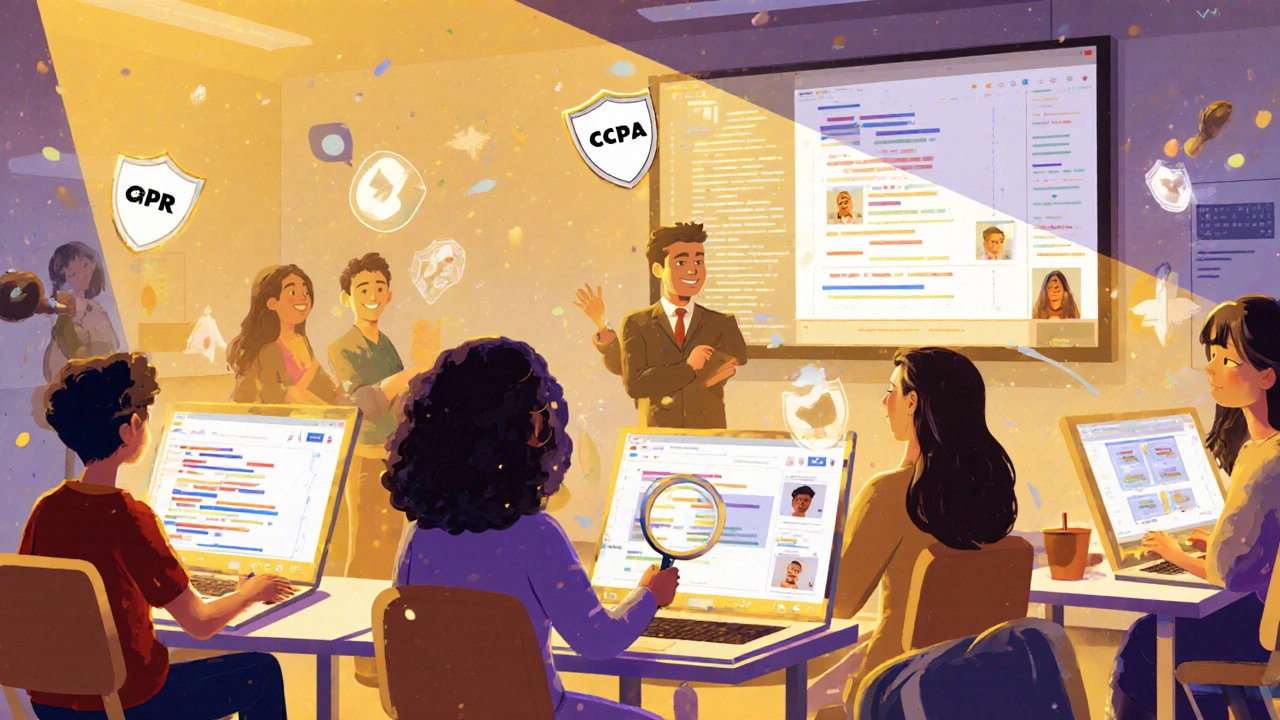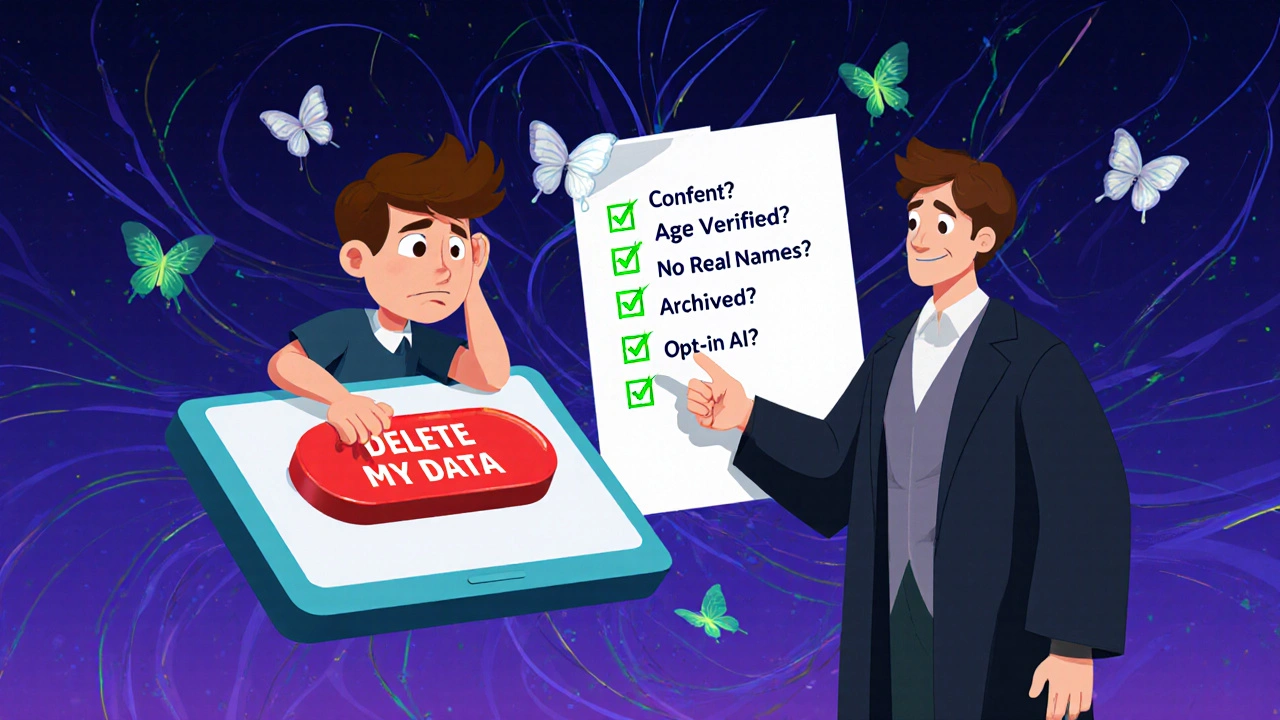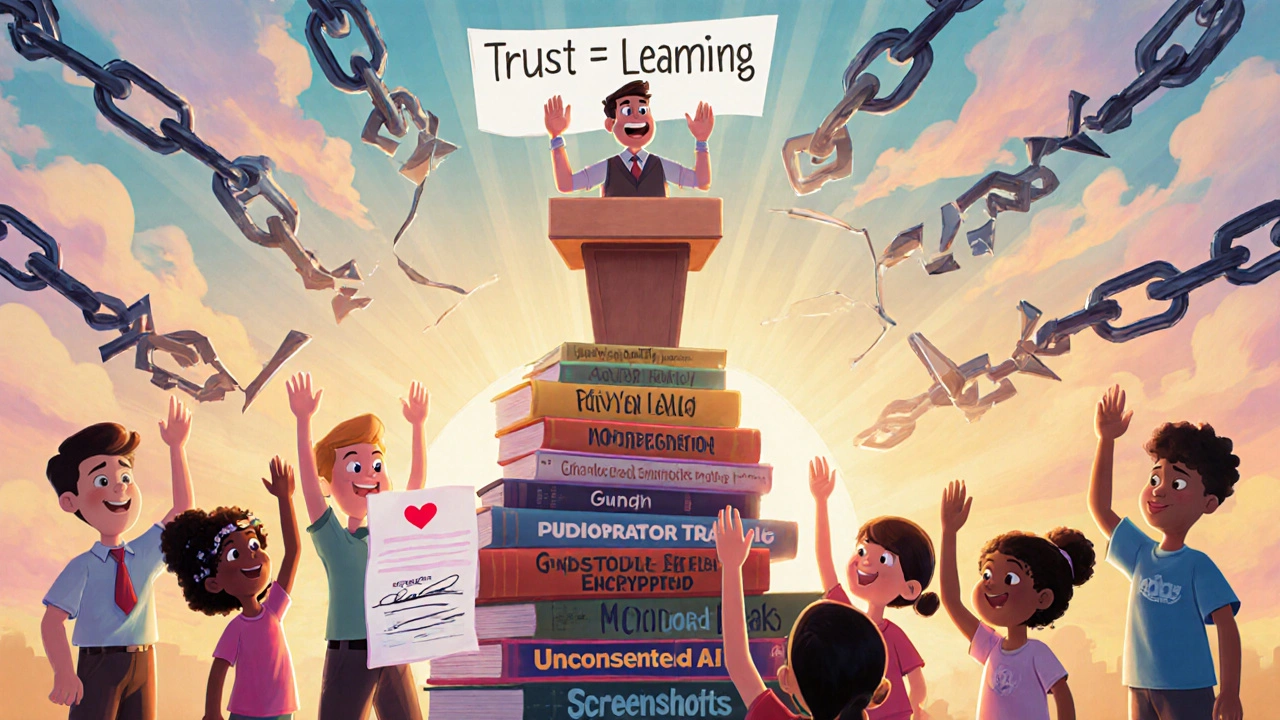Legal and Privacy Considerations in Online Community Management for Social Learning
 Nov, 1 2025
Nov, 1 2025
Running an online learning community isn’t just about posting lessons or moderating discussions. If you’re managing a space where people share personal experiences, homework, opinions, or even private struggles - you’re handling sensitive data. And that comes with real legal risks. Ignoring privacy laws or unclear rules can lead to lawsuits, platform bans, or worse - losing the trust of your learners.
Why Privacy Isn’t Just a Technical Issue in Social Learning
Think about a language learning group where students record themselves speaking to get feedback. Or a coding community where learners post their code for peer review - code that might include their real name, email, or even company projects. These aren’t just posts. They’re personal data. And under laws like the GDPR in Europe or the CCPA in California, you’re legally responsible for how that data is collected, stored, and used.
Most community managers assume that because they’re not collecting credit card info or selling data, they’re safe. That’s a dangerous myth. Even usernames, IP addresses, and timestamps can be personal identifiers under privacy law. If someone can be linked to what they posted - even indirectly - you need to treat it like confidential information.
What Laws Actually Apply to Your Community
You don’t need to be a lawyer to know the basics. Here’s what matters:
- GDPR (General Data Protection Regulation): Applies if anyone from the EU or UK joins your community - even if you’re based in Arizona. You must let users delete their data, explain how it’s used, and get clear consent before collecting anything.
- CCPA/CPRA (California Consumer Privacy Act): If you have members in California, they can ask you what data you have on them and demand it be deleted. You also can’t charge them more for using your service if they opt out of data collection.
- COPPA (Children’s Online Privacy Protection Act): If your community includes anyone under 13, you’re legally required to get verifiable parental consent before collecting any data - including names, profile pictures, or even comments.
- FERPA (Family Educational Rights and Privacy Act): If your community is tied to a school, college, or certified course, student posts, grades, or feedback might count as education records. You can’t share them without permission.
These aren’t optional. A single complaint from a parent, student, or EU resident can trigger an investigation. And fines? They can reach $20 million or 4% of your global revenue under GDPR.
How to Build Legal-Compliant Community Guidelines
Your community rules need to be more than “be nice.” They need teeth - and legal clarity. Here’s what to include:
- Explicit consent for data use: When someone joins, make them check a box saying they understand their posts may be visible to others and stored on your servers. Don’t bury it in fine print.
- Right to delete: Include a simple way for members to request their posts, messages, and profile data be removed. Don’t make them email support - add a button.
- Age verification: If your community isn’t designed for kids, require users to confirm they’re 13 or older. Use a simple dropdown. Don’t rely on self-reporting alone.
- Prohibited content: Ban sharing of personal info (phone numbers, addresses, student IDs) - even if it’s “just a joke.”
- Third-party tools: If you use Discord, Slack, or a forum platform, check their privacy policies. You’re still responsible if they leak data.
One online coding bootcamp got hit with a complaint because a student’s GitHub username and project link were posted publicly - and it led to unwanted job offers. Their guidelines didn’t mention that. Now they require all code shares to be anonymized and reviewed by moderators before posting.

What You Can’t Do (Even If It Seems Harmless)
Here are common mistakes that cross legal lines:
- Archiving public chats without notice: Just because something’s posted publicly doesn’t mean you can save it forever. You need to tell members you’re archiving and why.
- Using learner content for marketing: Don’t repost a student’s project as a “success story” without written permission - even if they seemed happy about it.
- Sharing screenshots of discussions: Even if you blur names, metadata can still identify people. Avoid screenshots unless you have consent.
- Using AI to analyze private messages: Tools that scan chat logs for sentiment or keywords to “improve engagement” are data processing under GDPR. You need explicit consent for that.
One language learning app got fined because their AI flagged “frustrated” comments and automatically sent users motivational emails. The users never agreed to that kind of analysis. It’s not helpful - it’s surveillance.
How to Protect Your Community’s Data
Legal rules are only half the battle. You also need technical safety.
- Use end-to-end encryption for private messages. Public forums? Fine. But DMs should be locked down.
- Limit data retention: Delete inactive accounts after 12 months. Don’t keep data “just in case.”
- Train moderators: They’re your first line of defense. Teach them to spot when someone shares personal info and how to respond - without violating privacy themselves.
- Use pseudonyms: Allow users to post under nicknames. Don’t force real names unless absolutely necessary.
- Choose compliant platforms: If you’re using a tool like Mighty Networks or Circle, make sure they’re GDPR and CCPA compliant. Ask for their data processing agreement.
One community manager switched from a free forum to a paid platform that offered built-in privacy controls. Their member trust scores went up 40% in six months - not because they added more features, but because people felt safer.

What Happens When You Get It Wrong
In 2024, a U.S.-based online study group for psychology students was reported to the FTC after a member’s therapy journal was accidentally shared in a public thread. The group didn’t have moderation filters or privacy rules. The founder received a cease-and-desist letter. The community shut down.
It wasn’t malicious. It was negligence.
Legal trouble doesn’t always come from hackers. Often, it comes from a well-meaning moderator who didn’t know better. Or a founder who thought “everyone does it.”
Start Simple: A 5-Step Privacy Checklist
You don’t need a legal team. Start here:
- Write a one-page privacy notice. Explain what data you collect, how you use it, and how users can delete it.
- Put it in your signup form and community welcome message.
- Turn off analytics that track individual behavior unless users opt in.
- Remove any public directory of members’ real names or contact info.
- Review your tools: Do your forum, video platform, or chat app have a data processing agreement? If not, switch.
Do this, and you’re already ahead of 80% of small learning communities.
Privacy Builds Trust - And Learning Thrives on Trust
People won’t share their real struggles, mistakes, or questions if they fear being exposed. Privacy isn’t a barrier to engagement - it’s the foundation. When learners know their voice won’t be used against them, when they know their data won’t be sold or leaked, that’s when real learning happens.
Don’t treat compliance as a chore. Treat it as part of your teaching mission. Your community isn’t just a space for knowledge. It’s a space for safety. And that’s worth more than any feature, plugin, or marketing campaign.
Do I need a privacy policy if my community is free?
Yes. Whether you charge money or not, if you collect any personal data - even just an email or username - privacy laws like GDPR and CCPA still apply. Free doesn’t mean exempt.
Can I use screenshots of student posts in my marketing?
Only with written, specific consent. A verbal “sure, go ahead” isn’t enough. You need a signed form or digital agreement that says they allow their content to be used for promotion. Never assume.
What if someone posts another person’s private info?
Remove the post immediately. Then privately message the person who posted it to explain why it violated your rules. If it’s repeated, suspend them. You’re legally responsible for what’s posted in your community - even if you didn’t post it yourself.
Do I need to store data in the same country as my users?
Not necessarily, but you need to ensure your hosting provider follows the same privacy standards. For example, if you have EU members, your server provider must offer GDPR-compliant data handling - even if they’re based in the U.S.
Can I use AI to auto-moderate my community?
Yes - but only if users know it’s happening and have a way to opt out. AI that scans messages for keywords, sentiment, or personal info counts as data processing. You must disclose this in your privacy policy and give users control over whether their data is analyzed.
Teja kumar Baliga
November 4, 2025 AT 21:05Just joined a coding group last week and realized half the folks were sharing full GitHub links with their real names. Didn't think twice until I read this. Now I'm asking everyone to use handles only. Small change, big difference.
k arnold
November 5, 2025 AT 17:48Oh wow. So now I need a lawyer just to let people ask about Python bugs? Next you'll tell me I need a waiver before someone says 'thanks' in the chat.
michael Melanson
November 6, 2025 AT 06:39This is spot on. I run a small ESL community and we had a parent complain because their 12-year-old's comment was archived. We didn't even realize COPPA applied. Now we have a simple age gate and auto-delete after 6 months. No more headaches.
lucia burton
November 7, 2025 AT 22:46Let’s not sugarcoat this: community management in the digital learning space is now a compliance minefield wrapped in a GDPR tangle with a side of FERPA chaos. If you’re not treating user-generated content as regulated data assets with lifecycle governance protocols, you’re not managing-you’re just gambling with litigation risk. And yes, that includes DMs, timestamps, and even IP-based geolocation metadata. It’s not paranoia. It’s legal architecture.
Denise Young
November 8, 2025 AT 19:15Wow. So the guy who posted his code with his work email got fined because someone else screenshot it? That’s not negligence-that’s a systemic failure. And yet, 90% of these communities still use free forums with zero data policies. We’re not protecting learners. We’re just hosting liability.
Sam Rittenhouse
November 10, 2025 AT 13:58I’ve seen communities die because of one careless moderator. One screenshot. One unredacted name. One ‘just sharing’ post that turned into a lawsuit. This isn’t about rules-it’s about respect. And if you don’t get that, you don’t belong running a learning space.
Peter Reynolds
November 12, 2025 AT 08:07My group switched to pseudonyms last year. No real names. No photos. Just usernames. We didn't lose engagement. We gained trust. People started sharing way more. Funny how that works.
Fred Edwords
November 12, 2025 AT 14:39It is imperative to note that the application of GDPR is not contingent upon the monetary status of the community; it is predicated upon the presence of data subjects within the territorial jurisdiction of the European Union. Furthermore, the retention of IP addresses, even transiently, constitutes personal data under Article 4(1) of the GDPR. Therefore, any failure to implement a lawful basis for processing-such as explicit, informed, and revocable consent-is a material breach, not a technical oversight.
Sarah McWhirter
November 12, 2025 AT 23:47Wait… so you’re telling me the government is watching my study group? Who’s behind this? Is this a data harvesting scheme disguised as ‘compliance’? I bet they’re using AI to scan for ‘negative sentiment’ and flagging people who say ‘this is too hard’ as ‘at-risk’… and then selling that to recruiters or insurance companies. You think this is about privacy? It’s about control.
Ananya Sharma
November 13, 2025 AT 16:15You call this a checklist? This is pathetic. You think a one-page notice fixes anything? You’re ignoring the real issue: platforms are built to exploit attention, not protect dignity. You can’t slap on a ‘consent’ checkbox and call it ethical. People don’t read terms. They click ‘agree’ because they want to learn. That’s not consent-it’s coercion. And you’re complicit if you think this is enough. Real privacy means no tracking, no archiving, no analytics, no AI. No exceptions. But you won’t do that, because then you’d have no data to monetize later.
kelvin kind
November 13, 2025 AT 21:22Just added a delete button. Took 10 minutes. Members haven’t used it yet. But now they know they can. That’s enough.
Ian Cassidy
November 14, 2025 AT 18:11End-to-end encryption for DMs? That’s overkill unless you’re handling medical data. Most of us just need basic moderation and a clear rule: no personal info. The rest is noise. Keep it simple.
Zach Beggs
November 15, 2025 AT 23:07Had a member ask if we archived chats. We didn’t even realize we were. Turned it off. No one noticed. But now we’re transparent. That’s the win.
Antonio Hunter
November 16, 2025 AT 05:52I used to let people post their school IDs to prove they were enrolled. Then I found out FERPA applies even to informal study groups tied to accredited courses. I shut it down. Now we use a simple ‘I’m enrolled’ checkbox with no verification. It’s not perfect, but it’s safer. And honestly? Most people just want to feel included, not prove their credentials.
Paritosh Bhagat
November 18, 2025 AT 04:58Oh please. You think GDPR is about privacy? It’s about control. Big tech wants you to think you’re safe so you keep giving them data. You’re not protecting learners-you’re making them feel like criminals for wanting to learn. And why do you assume everyone wants to delete their data? Some of us want to keep our progress. Your ‘delete button’ is just another way to erase identity. You’re not building trust-you’re eroding it with bureaucracy.
Ben De Keersmaecker
November 18, 2025 AT 22:11Interesting that you mention metadata. Even if you blur a name in a screenshot, EXIF data or screen resolution can sometimes be used to triangulate identity. I once helped a user remove a post from an old forum where their laptop’s hostname was visible in the URL. It’s wild how much you can infer from seemingly harmless details. Always assume someone can reverse-engineer identity.
Aaron Elliott
November 19, 2025 AT 20:08It is an epistemological fallacy to conflate legal compliance with moral virtue. The imposition of regulatory frameworks upon organic, peer-driven learning environments constitutes a form of institutional colonization-where the bureaucratic apparatus of the state, under the guise of protection, neutralizes the spontaneity and authenticity of human exchange. One cannot legislate trust. One can only suppress vulnerability. And in doing so, one extinguishes the very conditions necessary for authentic learning to occur.
Chris Heffron
November 21, 2025 AT 02:40Good post. I’m in Ireland, and GDPR here is taken seriously. We had to redo our whole forum setup last year. Added a consent toggle for archiving. Used a simple ‘Yes/No’ button. No jargon. People actually read it. Also, added a 😊 after the ‘delete your data’ button. Makes it feel less scary. Works wonders.